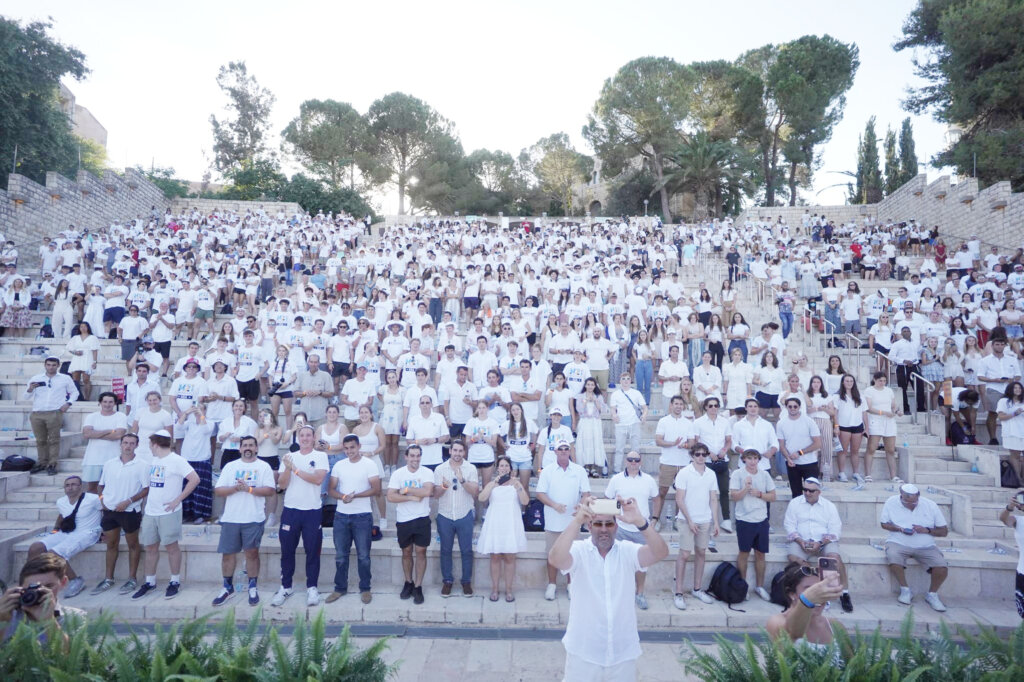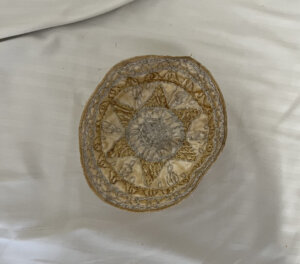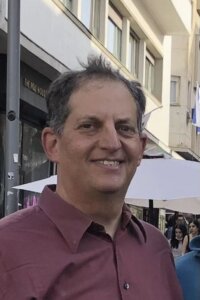At Maccabiah Games, 300 Jewish American athletes become bar and bat mitzvah
As kids, many spent more time on sports than in Hebrew school. The “Jewish Olympics” give them a chance to go through the ceremony in Israel.

Graphic by Angelie Zaslavsky
JERUSALEM — Growing up in suburban Atlanta, Josh Fountain found time for swimming, but not for a bar mitzvah.
He came to Israel this summer, one of 10,000 Jews from more than 60 countries, to compete in the Maccabiah Games, which officially open Thursday. Whether or not he earns a medal, Fountain, 23, will go home having had a bar mitzvah.
So will about 300 other young adults in the 1,300-strong U.S. delegation to Israel.
The group ceremony, held Monday afternoon at the edge of The Hebrew University of Jerusalem’s Mount Scopus campus, engenders in athletes “positive feelings so that they want to continue to be involved” in Jewish life, said Jeff Bukantz, the president of Maccabi USA, the American arm of the Maccabi sports movement.
“Building Jewish identity is paramount to what we do,” he said.
Maccabi USA organizes a weeklong educational tour of Israel for the American delegation before the competition begins. The bar and bat mitzvah ceremony is optional, an opportunity for athletes who never had one when they were 12 or 13 and who want to take part in the ritual in Israel.
Those who have gone through — or observed — it call it a powerful experience. And many attest — as its organizers hope — that it draws them closer to Judaism.

Goose bumps
The Maccabiah is the world’s second-largest athletic event behind only the Olympics, and has been held every four years in Israel since 1932. It was interrupted during World War II, and the current games were postponed from last year due to the pandemic.
Some of the world’s greatest Jewish athletes established their bona fides at the Maccabiah, including the legendary American swimmer Mark Spitz, who won 10 Maccabiah gold medals before earning his first of nine Olympic golds.
Fountain wants to capture some glory in the water himself at this year’s Maccabiah, where Americans make up the largest contingent of competitors after the Israelis. But at Monday’s bar and bat mitzvah ceremony, he was most focused on getting the prayer right.
Fountain strode onto the stage of the majestic stone amphitheater overlooking the Judean desert, as athletes crowded beneath an Israeli flag held horizontally, wedding canopy-like.

Encouraged to participate by his mother and grandmother, and wearing his late grandfather’s white kippah, Fountain haltingly recited into a microphone the blessing for a public reading of a Torah portion.
Then Rabbi Leor Sinai intoned a few verses from the scroll opened to the Book of Numbers. Someone in the crowd shouted, “Congratulations,” and Sinai proclaimed those on the stage to now be bar and bat mitzvah.
Marking his bar mitzvah surrounded by his teammates gave him goose bumps, Fountain said. He called it “a once-in-a-lifetime opportunity to embrace who I am.”
The American delegation has organized the group ceremony since 1993. Prior to that, its athletes could tack an individual bar or bat mitzvah onto their pre-competition tours of Israel.
Elianna Swell, a field hockey player from New Jersey, also decided to become bat mitzvah at the Maccabiah this summer. She thought of it as an affirmation of her Jewish identity, and of her commitment to social justice.
“With minorities further marginalized, I wanted to be able to identify as a Jew and be proud of it. I felt this was a first step in being reconnected,” said Swell, who will begin her junior year at Georgetown University in August.
The experience, she continued, helped her to realize “how much it matters to hold tight to tradition for a minority group.”
‘An entry point’
Sinai, who immigrated to Israel from New York and works as an educator, sees the ceremony as resonant well beyond the day.
“For these people to find their faith and identify their part in the chain of continuity is a very wonderful thing,” said Sinai. “To know that they’re part of something much greater than they could’ve imagined is very inspiring and fills me with optimism. It’s creating an entry point for them to walk in.”
Jeff Agoos attests to the occasion’s lasting power.
Growing up in Dallas, Agoos found that Hebrew school conflicted with soccer practice, so he never had a bar mitzvah. He came to the 1989 Maccabiah as a 21-year-old player, and joined his team for a pre-competition tour of Masada.
When asked if he’d like to have a bar mitzvah at the site, a symbol of Jewish pride, he said yes.
Agoos went on to excel on the field for the University of Virginia and later professionally, and was inducted to the National Soccer Hall of Fame. Now 54, he is a senior vice president for Major League Soccer.
This week, visiting Israel for the first time since the ’89 Games to be inducted into the International Jewish Sports Hall of Fame, he thought back to his Maccabiah bar mitzvah at Masada 33 years ago.
“It filled something I was missing,” he said.
“I’m not the most Jewish person you’ll meet, but it did reaffirm a belief in the religion and the people. It was a profound experience.”
















